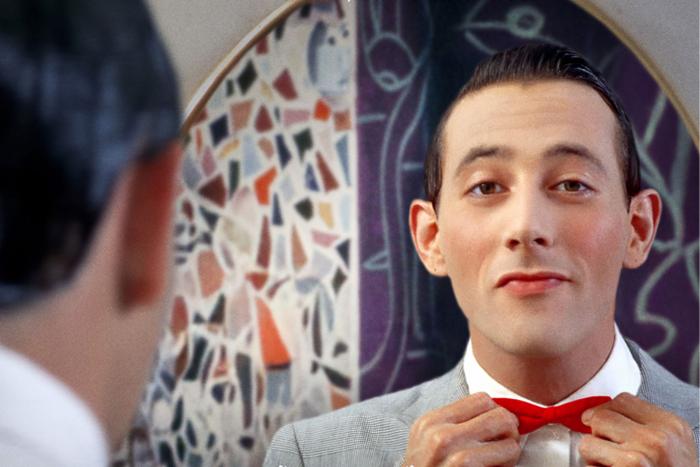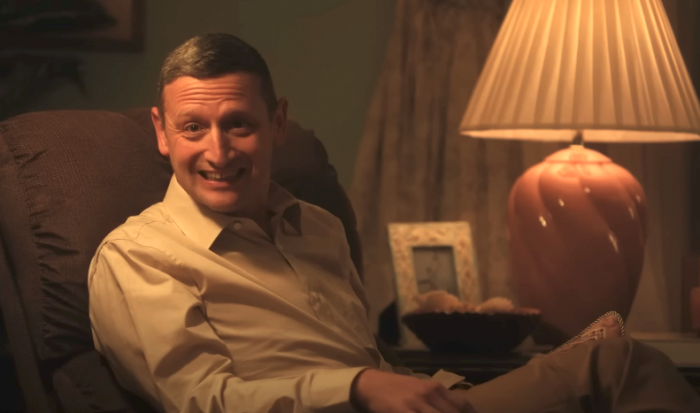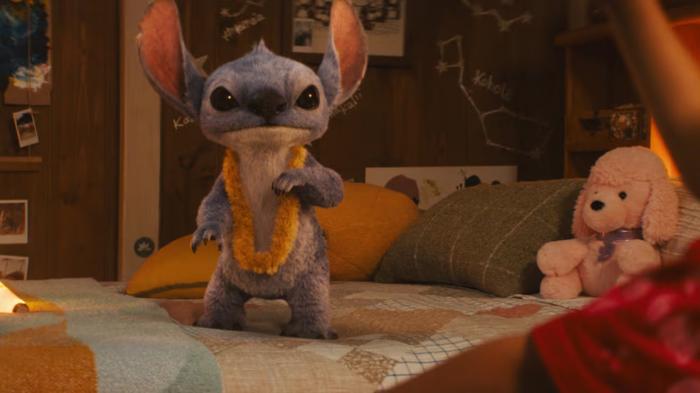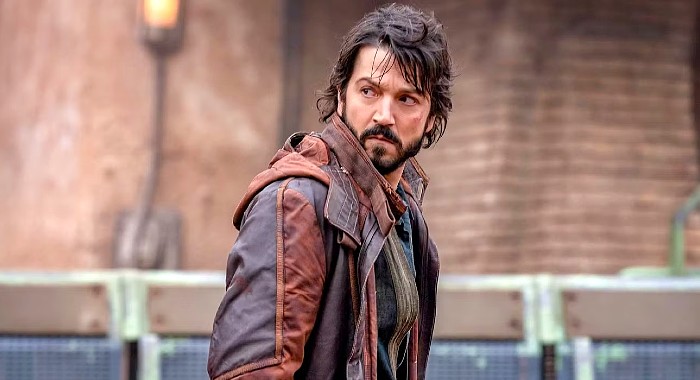
The Luckiest Boys in the World – 'Pee-wee as Himself' Doc is One Final Glorious Gift From Paul Reubens
By Jason Adams | TV | May 24, 2025

It’s tempting for a gay writer like me to say here in retrospect that the titular Playhouse that the series Pee-wee’s Playhouse was centered around—a magical structure that stood half-Sphinx in the middle of a claymation forest, where Chairs and Floors and Genies alike all sang and screamed and let their imaginations slash ids run amok—was its maker Paul Reubens turning The Closet he’d chosen to live in into something wondrous. An escape from his, our, stifling reality.
That’s surely what it felt like to me, even if I didn’t know it by those exact words, as a kid. An only child, a lonely kid, one of many millions who tuned in to CBS for five seasons in the 1980s to make their own little cloistered lives feel big, possible, wondrous. We weren’t lonely with Pee-wee around—everything was our friend. You could just slap a “y” on it and your clock was all of a sudden Clocky, a sentient dance partner; someone who wouldn’t spitball you during first period or sneer that your sneakers were cheap. It was okay to dance around in your mom’s high heels, to want to literally marry your fruit salad because it was so gosh-darn delicious. To scream and bounce off the walls and be just a little bit “too much” for other people to deal with. Pee-we got it and thank goodness someone did.
All of that was Reubens’ intention. He was talking directly to me, and the millions of weirdo oddballs just like me out there needing the oxygen he was providing. But as he makes clear more than once in director Matt Wolf’s deeply illuminating and beyond moving two-part documentary Pee-wee as Himself that aired on HBO this weekend, while it might be tempting to draw conclusions about his off-screen personal life being the repression-engine that drove his work, that isn’t what he wanted this documentary about his life and work to be. He seems mortified by any “tears of a clown” narrative swallowing up his legacy, of which he remains rightly proud.
And Reubens knew as he gave his forty brief hours of sit-down interviews for it that this documentary was going to end up being his last chance at shaping his story the way he wanted to—he’d been secretly fighting cancer for several years (even the filmmakers didn’t know this) and he passed away on July 30th 2023 still in the middle of its making, leaving a red-bowtie-shaped hole in the world. He says at the doc’s start he doesn’t want this to be a “Legacy” piece, but also that “Death is so final, and to be able to get your message in at the last minute is incredible.”
Incredible it is. As Natasha Lyonne herself says at one point here (as a little girl she played the character of “Opal” on the show), being inside the Playhouse felt like “permission to be myself.” And I think that’s what any fan of Reubens’ work took away from it. I certainly did.
And yet what makes Pee-wee as Himself so fascinating, beyond just the sheer joy of getting to spend time with Reubens one last time and to listen to him explain how all of his many life-long influences (everything from Howdy Doody to Andy Warhol) banded together and shot into him like a lightning bolt with the creation of Pee-wee Herman, is how Pee-wee was an undoing of Reubens himself. An erasure. How his entire public life became non-stop performance art, and how his controlling will to funnel all of himself into this man-child the world fell in love with ultimately became its own sort of burden for Paul, the man behind the claymation curtain.
You see that unbending will on display from the opening minutes of Pee-wee as Himself, as Reubens openly argues with director Matt Wolf about how he doesn’t like handing over his story, and how he thought he should direct this doc himself. He struggles for the word, the lynchpin of why he ultimately had to hand over the reins to another person—“Perspective,” Wolf tells him. Reubens smiles devilishly. “Perspective,” he repeats.
If you’re as big a Reubens nerd as I am then the stuff about the making of Pee-wee’s Big Adventure and the Playhouse show might already be well known to you—if not, then you’ll surely find it all fascinating. (Punk! Drag! Steve Martin, oh my!) What makes all of that electric in this documentary though is that Reubens finally openly (if occasionally with amused hostility) frames it all within the context of his gayness. “Yes, there is gay subtext to Pee-wee’s Playhouse” he giddily admits at last (over hilarious footage of beefcake builders toiling away half-naked in the Playhouse), making sure to follow that by verbalizing a dramatic sound effect for the doc’s non-revelation needle-scratch.
Reubens talks about coming out to his parents in the 1970s after he’d fallen in love with a guy named Guy (who was responsible for several familiar Pee-wee-isms), and how accepting they immediately were; how his manly-man father (Paul compares him to Indiana Jones) wrote him a letter telling him that if he’s going to be a homosexual then he needs to be the best homosexual he can be. (This is where I personally started crying, which kind of never let up for the remaining three hours.) Paul’s only sister is herself a lesbian, and she delights in showing off a photo of her and her brother dressing up in drag for an early Halloween—Paul as a princess and her as a Large-Marge-esque lumberjack. (And if you can’t see all of the footage of Paul’s mid-century childhood being funneled straight into the Playhouse then you might need better glasses, Pointdexter.)
Much of Reubens’ early performing involved gender nonconformity—he grew his hair long, wore make-up, did short films in drag (notably at one point playing a mermaid he based on Cher). Paul himself draws a direct line between the concept of “passing” in drag and what he would be doing with Pee-wee a decade later—an alter-ego so top to bottom, so believable, that it would eclipse any self and exist fully on its own. Once Pee-wee was birthed during his time in The Groundlings comedy troupe in Los Angeles he began elbowing more and more of Paul out of the way—Reubens began going on talk shows in character. (His episodes with David Letterman are legendary.) Fueled on by his breakup with Guy, Reubens seemed to want to lose himself in his work completely. And when Guy died of AIDS a few years later that terror seems to’ve really taken hold. And the irony that his later “passing” in the straight world involved him covering up his openly gay past does not seem to be lost on Paul even a little bit, “perspective” or no.
The tension between the man Paul Reubens and his creation of Pee-wee Herman really comes to a head though first with Reubens’ 1991 arrest for indecent exposure in an adult movie theater, and then later in 2002 when he was wrongly accused of possessing child pornography. (An avid collector, Reubens simply had a massive collection of those old queer-coded beecake Physique Pictorial magazines from the 1950s and 60s, which the police decided they’d then label as obscenity.) Both of these confrontations with the law can be seen now for the homophobic witch-hunts they were, but they did enormous damage to his public image (no doubt the police’s purpose) and unfortunately to Paul’s own self-confidence. Along with the failure of his movie Big Top Pee-wee, Reubens spiraled and began to hide himself away. And it took many years and a circle of very close friends (Debi Mazar and David Arquette seem like his biggest life-lines during this period) who knew the real Paul, the one behind that gray suit, to drag him out of it.
Still he’s definitely a different, more jaded man on the other side. And that’s the man we see arguing fairly non-stop with the documentary’s director about issues of trust. And “perspective.” The man who gave so many of us the permission to be ourselves was giving us what he couldn’t quite grasp.
Paul made the choice himself to go back into the closet for the sake of his career, but was that really a choice? Or was it the only option there was? And yet we poked and pried our way inside anyway. We gleefully tore him down with tabloid garbage, turning his expression of child-like wonder and love into a joke taken out of his hands, sharpening it down into a shiv to be wielded against him. So it goes still today with so many LGBTQ creators—our intentions poisoned by a culture that does with acceptance what Lucy does to Charlie Brown with her football. So it’s not a wonder Paul is sometimes defensive.
Yet this documentary, his final red-bow-wrapped gift to us, does accomplish what it and he wanted. He knew he had “some ‘splainin’ to do” and in so doing you can see the years of dust that had gathered over the bright pure candy heart of Pee-wee being finally brushed away. “Everything I did and wrote was based in love,” Reubens says in his final dying message to us, and by doc’s end (as the tears choke out of you) you’ll know it to be true. The only truth that actually matters. He did his dad proud and was the greatest homosexual he could be, and he was a best friend to millions of us right when we needed him the most. Paul Reubens saved my life. And probably many of yours too. To paraphrase Pee-wee says as he flies off into the sky, his greatest wish granted, we’re all the luckiest boys in the world. Thank you from the depth of my everything, Paul. And also—I know you are but what am I???



